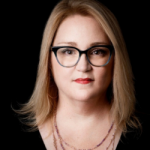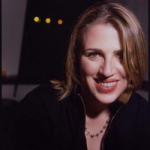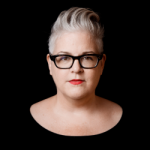
Ovarian Rhapsody: Choosing Your Cancer Hero
“This chair pattern is driving me nuts,” says my husband. We are sitting in NYU’s waiting room, about to meet the first oncologist on my list. “And isn’t it funny how they have to put those dots across the glass so people don’t run into the pane?”
My husband, the architect, is always analyzing how a room could be better or why certain design choices are made. I’m looking around too, making different kinds of notes.
- A hushed room, friendly staff
- Bundled up cancer patients — some with caps, some with wigs — reading “courtesy of NYU” People magazine
- A bit depressing, but of course it is
- Red couches accented by intertwining geometric shapes made to look cheery but not too fun
You never know, some of this random detail might help me select my doctor and my choice of cancer care. No, really.
After scores of friend-of-a-friend suggestions, scouring RateMds ratings, New York magazine best doctor lists and insurance coverage checks, I narrowed my list of possible oncologists down to two: one at NYU Langone and one at Memorial Sloan Kettering Cancer Center.
And props to me; I did it fast. I had no choice.
When I was diagnosed with ovarian cancer last November, I was in the midst of recovering from a cyst removal surgery. So I thought, ok, well let’s schedule this next surgery for early next year, right?
“Ehhhh…no,” said my doctor. ”This needs to come out immediately. There is no waiting.”
Because cancer is life or death, every decision you make feels like life or death.
“Are you sure? Really?”
“There is no waiting.”
She recommended a couple oncologists, and everyone I knew counseled me to get a second opinion. Not having enough time to feel frustrated or scared, I went into some sort of fight-or-flight, self-preservation mode and started making spreadsheets. I’m someone who likes to quantify her choices. My desire to make the right choice became all-consuming.
It was easier, certainly, than focusing on the fear. When cancer — or, really, any medical crisis — hits you, you suddenly have a myriad of uneducated choices to make: which doctor, which hospital, which body parts they remove, which body parts they leave, what food to eat, what dubious supplements to take, where to find the magical cancer-fighting mushrooms you can only get from one doctor in Chinatown. It’s entirely overwhelming. And you’re not qualified to assess — you’re not a freaking doctor. But you think you need to start playing one on TV. Then you watch a video by some guy who says cancer treatments and chemotherapy is B.S. and think, “Oh my god, is this all a big scam?” You ask three doctor friends who reassure you, it’s no scam. But aren’t they biased? You become suspicious of everything.
While my husband accompanied me to all of the appointments, he told me he purposefully tried to stay out of the decision (design insights notwithstanding).
“You have to go with your gut. This is your treatment.”
“But what if I don’t trust my gut?”
“Trust your gut.”
I bought a fancy bright red and blue notebook from the McNally Jackson bookstore to keep track of the details, questions and thoughts (also, a fancy notebook makes me happy.) I was lucky to be in a city with many extraordinary cancer care centers, so it was tough to make a wrong choice — which in some ways, makes it all the more tough.
Because cancer is life or death, every decision you make feels like life or death.
I’d narrowed down the field to two women, board-certified, in their “I’m still excited about my job!” mid-career, which is totally judge-y and subjective, but so is everything about choosing a doctor. People will tell you go for the head of the department, and while that makes some sense, I wanted someone who would have time for me, an aggressive and hungry number two. So after much searching and in-network distilling, it was between a doctor at NYU Langone and one at Memorial Sloan Kettering. Only two choices; easy, right? Ha.
Both of these women were at the top of their game, so ultimately it came down to some silly and not-so-silly details.
**
NYU was the first place we looked. I had strong recommendations for this NYU surgeon — my gynecologist recommended her, as did my yoga teacher, a cancer survivor who had also been her patient. A karmic message? Sure, why not.
My initial impression was that the hospital seemed very local; New Yorkers on their way to work to get cancer treatment. And it felt like a doctor’s office — high tech, glass-paned, sleek. I noted how fast it took for the scheduling representative to get back to me, and she was amazingly quick — that alone was huge.
I didn’t love envisioning myself as a frog splayed out on a lab table, but so be it.
After meeting with a few nurses and “pre-doctors” who asked me all the necessary questions, it took a while to finally meet the oncologist, but when we did, I was impressed. She was charming. Forthright. Delightfully geeky in a lab coat that seemed to engulf her small frame. We talked about Brooklyn where she used to live with two other roommates as a college student. She told me a story of the rent being so cheap and that the landlord only cared if they kept the place clean. “We’ll try,” she laughed. I liked her vibe.
She gave me details about the proposed surgery, but only as much as I asked for.
“I want you to stay in the moment,” she told me.
She described my surgery simply, and she focused more on the technique, the robotic arms and why they helped her. I guessed some people were freaked out about a War Games-like robot intervening. Margit, shall we play a game? But it made me feel cutting edge. The surgery itself was straightforward – ovaries, fallopian tubes, the uterus, some lymph nodes and the omentum (who knew? A layer of fat that surrounds the abdominal organs) needed to be removed. She likened it to a dissection of many parts so they could biopsy all of it and make sure the cancer didn’t spread. They’d examine each bit piece by piece. I didn’t love envisioning myself as a frog splayed out on a lab table, but so be it.
“I am good at what I do,” she reassured me.
Just a few days later, I met with the doctor at MSK, recommended to me by a friend of friend. I felt we had to look at, arguably, one of the most famous and highly regarded cancer centers in the world — #2 after all.
One thing I didn’t like about MSK was that it was crowded. Busy. This place was a destination for cure-seekers from all over the world. I felt a bit shuffled along and waited a much longer time to see the doc, much longer than at NYU. After the exam, we had to stay in the exam room. “There’s no room today, we’re really busy.”
I was somewhat surprised at how much it didn’t look like a doctor’s office — folksy, grandmother’s living room-style rattan coffee tables and cozy couches. That might work for some people; it made me feel overly cuddled. Their staff was smart, more cheery than NYU perhaps, but the thing I couldn’t get past was the regular clothes. The person in billing who checked my insurance actually wore a hoodie.
In keeping with that, the MSK doc didn’t wear a lab coat but a bright orange boucle jacket and black leather knee-high boots. She was immediately friendly and noted we were both wearing the same color orange (my jacket.) She was funky and fancy and maybe someone I’d kind of like to hang out with. Still, I found myself staring at her black eyeliner, which was way askew. I couldn’t stop myself from thinking, “If she can’t apply eyeliner, how steady is her surgical hand?”
See? Silly detail.
She focused on the fact that I had a lot of endometrial scarring, which was interesting – the NYU doctor hadn’t mentioned it. When she explained the surgery, she drew a picture with a Sharpie of what she was going to do and took me on a journey that somehow also included my heart and maybe not as many lymph nodes. It was a bit confusing. Also, she said she’d make five incisions as opposed to three and she described the procedure, also robotic surgery, as “radical debulking.”
She made sure to mention that I should consider weight loss.
“Now?” I asked, “Like immediately?”
“No, no, after recovery. You don’t want to feed the cancer. The fat cells create estrogen. You should be told this; it’s the right thing to do.”
As if maybe she wasn’t supposed to say this to me? She definitely gave me a lot more information than the NYU doc, which I initially liked, but she was definitely not about staying in the moment — she was more about the big picture.
“This is my art form,” she reassured me.
It was a tough choice. I liked both doctors— a lot. The chief differences between them seemed to be about “stay in the moment” vs. “lots of detail.” I’m typically a “lots of detail” kind of gal, but I wasn’t sure that was the right approach for me when dealing with cancer. The detail made me feel overwhelmed.
Still, I followed up with NYU’s doc to see if she agreed with some of that detail — the number of incisions, the endometriosis, the weight loss. She agreed with just about everything Dr. MSK had said, was approaching the surgery in the same exact way, and was happy to answer details at any time. I just had to ask.
I ended up choosing NYU. Ultimately, I based my final decision on my rapport with the doctor, the environment, the staff, the access and the location (NYU is a little closer). But I could see someone else digging the MSK approach.
Truly, it was pure gut instinct. Turns out I did have a gut after all.
Choosing your cancer hero (cause that’s what my doctor is to me) is entirely a personal decision. And you learn fast that your hero can only be as good as the input you give her. You have to be your own health advocate.
Now, two months into this, after surgery and six weeks into chemo, I can say I’m happy with my choice. Did I make the absolute right choice? Who knows. I have moments where I wonder what the other path would have been like. But I try to ignore that voice.
I remind myself of the words of my doc: let’s stay in the moment.
Read more of Margit’s column, Ovarian Rhapsody:
3 Responses
-

stacy morrison Thank you for sharing all this. It’s kind of refreshing and great to read the minutia of cancer, the daily *life*ness of it. So often we get all the soaring platitudes and life lessons, but dammit, cancer must be lived, too. Its not just a WordPress Theme or a Motivational Quote. So thank you. Thanks for humanizing and ordinaryizing this thing we all hate and fear and loathe. #fuckcancer but #celebratemargit. Also: Why does no one leave comments on posts anymore? xo
-

Caroline Waxler Margit,
Thank you for sharing this story. Thinking of you and you go throw this incredibly difficult journey.
Caroline -

Caroline Waxler *through
Leave a Reply


Tell Us in the Comments
What do you think?